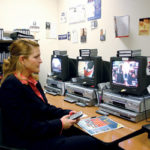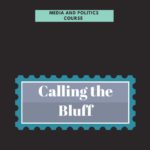This project serves to integrate tech resources into a Media & Politics class to augment and create engaging student learning opportunities and to investigate concepts and ideas from a Memphis-centered perspective.
This proposal focuses on a course redesign of Media & Politics, making it a more “Memphis-centered” course and integrating innovative pedagogies and digital technologies to enhance independent student research. First, Professor Jasperson plans to integrate Memphis-centered material and digital technologies into the course in order to encourage students to make connections between the literature and real-world events, problems, and issues. The goal of this aspect of the redesign is to promote integrative learning and enhanced understanding of real-world issues and how our local institutions act in informing our citizens. Second, she hopes to encourage students to complete research projects using Memphis-centered issues and data. Data originating from Memphis-centered media and issues will allow students to investigate their own questions about media and politics and to connect learning with community-based cases. Tying content to Memphis will help to achieve the aim of capturing students’ attention while fostering knowledge about the larger community and their place in it.
This course redesign aims to foster greater student understanding of issues facing Memphis as they intersect with the broader topic of media and politics. Students will have the opportunity to develop applied research and analytical skills in answering their own questions using locally-relevant data. This course should assist in drawing connections between ideas from the discipline, real-world issues, and their own place in the community.
Examples for class:
1) Historical readings examine the development of several media eras marked by technological change and innovation. Multi-media technology can help to bring these eras to life through examples and cases. These links below provide insights from media coverage of the civil rights protests in Birmingham, Alabama. This project aims to add digital Memphis-centered content from the National Civil Rights Museum in Memphis and other resources:
http://www.nytimes.com/2007/01/21/books/review/Arsenault.t.html
https://www.paleycenter.org/the-civil-rights-movement-and-television
https://www.civilrightsmuseum.org/the-children-shall-lead-them
2) Ultimately, students should increase their awareness and engagement with local metro news as well as national news. One idea for engaging students is to have them aggregate the most essential local news stories of relevance to the city to share with Rhodes students. Following the model of The Skimm, students can create a Memphis-centered version of news they can use (“Calling the Bluff”) to circulate to the campus.
3) Students will have the opportunity to engage with content and to apply ideas and concepts from news media (agenda-setting, framing, priming; structural, situational, and ideological biases) to make comparisons, render analyses, and draw their own conclusions from digital news clips.

Amy Jasperson
Associate Professor and Chair of Political Science
Dr. Jasperson’s teaching and research focus on American politics, political communication, public opinion, and political psychology.




